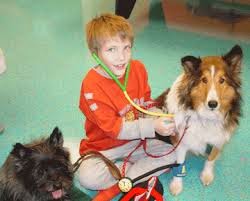The Benefits of "Therapy Pets" for Kids on the Autism Spectrum
Pets and kids with Asperger's or High-Functioning Autism (HFA) can be a great combination and give these children an opportunity to relate to another living being. Children with behavioral and social issues can be difficult to work with, and most of them have trouble trusting others. Dogs, cats, elephants, lizards, rabbits and horses can successfully be used in animal therapy (called Animal Assisted Therapy).
Animal Assisted Therapy provides an experience with an animal that is non-judgmental, gives affection unconditionally, and provides opportunities for physical and emotional therapy. This includes therapy for strengthening muscles through horseback riding, low-impact swimming with dolphins, and a boost of confidence with service dogs and companion dogs. These pets promote confidence and self-esteem while motivating children on the autism spectrum to interact and get stronger.
There are many cases in which kids with Asperger's and HFA have close relationship with special pets (e.g., dogs, cats, rabbits, etc.). The violent tendencies of "special needs" kids disappear while they play with the pet. Having a pet often promotes a healthy personality in kids, including trusting, respecting, contributing, self-confidence, commitment and responsibility. It also can teach these kids problem-solving skills, decision-making skills, language and social skills.
A meta-analysis found that animal-assisted therapy is associated with improving medical difficulties, behavioral problems, and emotional problems in kids on the spectrum. They also report the following improvements in:
- Attention skills (i.e., paying attention, staying on task)
- Leisure/recreation skills
- Reducing anxiety
- Reducing loneliness
- Self-esteem
- Verbal interactions between group members
The research into Animal Assisted Therapy is relatively new, and professionals believe more research is needed. However, there's a general consensus that “therapy pets” aid in the treatment of kids with Asperger's and HFA. As with other types of animal assisted therapy, the introduction of the animal seems to calm and soothe these kids. Often, they begin making eye contact with the animal first, then with people. Therapy usually results in these kids becoming more open – first with the pets, and then with people.
Moms and dads often bring a pet into the family to teach their child a sense of responsibility, or perhaps to provide him/her with a playmate. But these kids often learn something more fundamental about themselves and the world: how to empathize with others, how to understand subtle feelings, and how to look at the world from a vastly different perspective. The youngster learns how the world and living things are interconnected.
On the emotional level, pets can teach autistic kids many things, including:
- Communication: The kids learn the subtle cues their pets give them to indicate their feelings. They can later apply this lesson to human interaction because they are more attuned to watching for body posture.
- Confidence: The kids go through life under constant evaluation. They are rated by their behavior, grades and athletic performance. This is especially true of middle school students. Pets have no such expectations; they're delighted that the youngster is with them. Pets give kids the sense of unconditional acceptance. No judging or rating is involved.
- Empathy: The kids often become curious about the emotions their pets feel. This curiosity will extend itself to others. Animals offer an avenue for kids to explore their curiosity. For a youngster, curiosity can lead to hope and to greater engagement with the world around them.
- Nurturing skills: If properly supervised by adults, a youngster learns how to take care of another living being, and take pleasure in keeping the pet healthy and happy.
- Resilience to change: The kids who undergo traumatic experiences often cope better when they have a pet to confide in. Loneliness is very dangerous to kids. Having an animal companion can make them feel a part of something.
One study explored the relationship between pets and Asperger's kids. Specifically, the study, conducted by a child psychologist in New Mexico, looked at the effect dog ownership had on 10- to 12-year-olds. The researcher was surprised at the difference in empathy and self-esteem between pre-adolescents who owned a dog and those who did not. This research supported the growing body of evidence that shows dog ownership has statistically significant impact on self-esteem and sensitivity toward others. A pet has no such measures of success or failure; acceptance is total, which provides a sense of self worth.
Pets also teach these young people about the importance of taking care of themselves. For instance, one therapist says she teaches kids why it is important to take care of a pet, brush his teeth and keep him clean. When they understand the importance, the therapist turns the focus on the kids themselves. If brushing a dog's teeth is important for his health, then naturally it is important for the youngster's well being.
This doesn't necessarily mean that all kids with the disorder are ready for pet ownership. Moms and dads should first make sure their youngster desires a pet before rushing out to get one. Together, they should decide what type of pet is best. Moreover, don't assume your youngster will take care of the pet. The ultimate responsibility usually falls on the parent, not the kid, to make sure the pet is healthy.
As most of us with pets realize, pets can be a source of comfort and happiness. It is no surprise that they can also have therapeutic and healing benefits. The playful nature of pets seems to help bring kids with Asperger's and HFA out of isolation.
More resources for parents of children and teens with High-Functioning Autism and Asperger's:
More resources for parents of children and teens with High-Functioning Autism and Asperger's:
==> How To Prevent Meltdowns and Tantrums In Children With High-Functioning Autism and Asperger's
==> Parenting System that Significantly Reduces Defiant Behavior in Teens with Aspergers and High-Functioning Autism
==> Launching Adult Children with Asperger's and High-Functioning Autism: Guide for Parents Who Want to Promote Self-Reliance
==> Teaching Social Skills and Emotion Management to Children and Teens with Asperger's and High-Functioning Autism
==> Parenting Children and Teens with High-Functioning Autism: Comprehensive Handbook
==> Unraveling The Mystery Behind Asperger's and High-Functioning Autism: Audio Book
==> Highly Effective Research-Based Parenting Strategies for Children with Asperger's and High-Functioning Autism
____________________
Do you need the advice of a professional who specializes in parenting children and teens with Autism Spectrum Disorders? Sign-up for Online Parent Coaching today.
____________________
____________________



